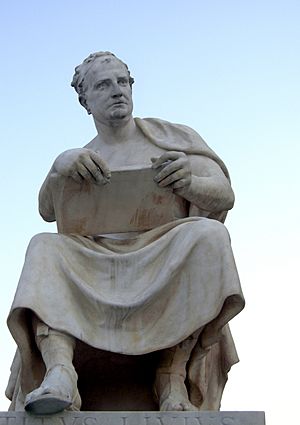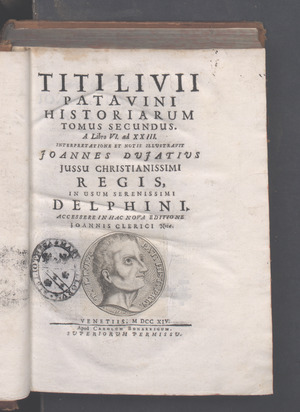Livy facts for kids
Quick facts for kids
Livy
|
|
|---|---|

Titus Livius statue at the Austrian Parliament Building in Vienna, Austria
|
|
| Born |
Titus Livius
59 BC |
| Died | AD 17 (aged 74–75) Patavium
|
| Occupation | Historian |
| Scientific career | |
| Influences | |
Titus Livius, known as Livy in English, was an important Roman historian. He lived from 59 BC to AD 17. Livy wrote a huge history book about Rome and its people. This book was called Ab Urbe Condita, which means 'From the Founding of the City'.
His book covered Rome's story from its earliest legends, even before it was officially founded in 753 BC. It continued all the way through the time of Augustus, who was emperor during Livy's life. Livy was friends with important people in the Roman imperial family, including Emperor Augustus himself. He even encouraged the young Claudius, who later became emperor, to write history too!
Contents
Livy's Early Life
Livy was born in a city called Patavium, which is now modern Padua in northern Italy. This was probably in 59 BC. At that time, Patavium was the second richest city in Italy. It was also the largest in a region called Cisalpine Gaul. This region later became part of Italy, and its people became Roman citizens.
Livy loved his hometown of Patavium very much. He often wrote about his pride in the city. Patavium was known for its traditional values. Livy was a quiet person who disliked violence. The peaceful times he lived in allowed him to focus on writing about Rome's past.
Growing Up During Roman Civil Wars
Livy was a teenager during the 40s BC. This was a time of many civil wars across the Roman world. The governor of Cisalpine Gaul, Asinius Pollio, tried to get Patavium to support Mark Antony. Antony was one of the leaders fighting for power.
The rich citizens of Patavium refused to give money or weapons to Pollio. They even went into hiding. Pollio tried to bribe their slaves to find them, but it didn't work. Instead, the citizens chose to support the Roman Senate. Because of these wars, Livy probably couldn't study in Rome. He also likely missed a trip to Greece, which was common for young noblemen then.
Many years later, Asinius Pollio made fun of Livy's writing style. He said Livy's Latin had "provincialisms," meaning it sounded like he was from a small town. This might have been because Pollio was still upset about Patavium's actions during the civil wars.
Livy in Rome
Livy likely moved to Rome in the 30s BC. He probably spent a lot of time there, even if it wasn't his main home. He never became a senator or held a government job. His writings show he didn't know much about military matters. This suggests he probably never served in the Roman army.
However, Livy was well-educated in philosophy and public speaking. He seemed to have enough money to live independently. We don't know where his wealth came from. But his financial freedom allowed him to spend most of his life writing.
Livy sometimes read his works to small groups. He was close to Emperor Augustus and his family. Augustus was seen by later Romans as a great emperor. This helped Livy's reputation long after he died. We know that Livy encouraged the future emperor Claudius to write history when Claudius was a child.
Livy's Famous Book
Livy's most famous work is his History of Rome. This book tells the complete story of Rome. It starts from the city's founding and goes up to the death of Augustus. Livy wrote his history during Augustus's rule. So, his book often highlighted Rome's great victories.
He wrote about Roman heroes to support the new government Augustus had created. In the introduction to his history, Livy said he didn't care about his own fame. He just wanted his work to "preserve the memory of the deeds of the world’s preeminent nation." Livy often wrote about events that happened hundreds of years before his time. Because of this, some parts of his work might not be perfectly accurate. Still, many Romans believed his stories to be true.
Family Life
Livy was married and had at least one daughter and one son. He also wrote other things, like an essay for his son. He wrote several dialogues, which were like conversations, similar to those written by Cicero.
Titus Livius died in his hometown of Patavium in AD 17.
Livy's Works
Livy's only book that still exists today is known as History of Rome. Its full Latin title is Ab Urbe Condita, meaning 'From the Founding of the City'. This book, along with the writings of Polybius, is a main source of information about the Second Punic War.
Livy started writing this huge work when he was about 32 years old. He kept working on it until he was old. He moved from Rome back to Padua, probably during the rule of Emperor Tiberius. Some ancient writers say Livy also wrote other essays and philosophical works.
See also
 In Spanish: Tito Livio para niños
In Spanish: Tito Livio para niños
 | Tommie Smith |
 | Simone Manuel |
 | Shani Davis |
 | Simone Biles |
 | Alice Coachman |


